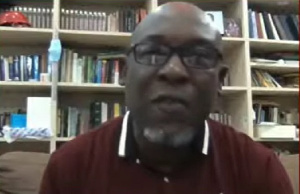 Vice President of IMANI Africa, Kofi Bentil
Vice President of IMANI Africa, Kofi Bentil
Vice President of policy think-tank, IMANI Africa, Kofi Bentil, has said it is necessary for Ghana to review the contractual agreement between the Ghana Airport Company Limited (GACL) and Frontiers Health Services Limited.
Frontiers Health Services Limited signed a contract with GACL on September 1, 2020, giving them the exclusive right to provide mandatory Covid-19 testing on passengers at the Kotoka International Airport for two years.
Recently, it was revealed that Ghana has made just $1million out of the over $17million that has been yielded from the testing at the airport.
Reacting to this on JoyNews’ ‘NewsFile’, Kofi Bentil said “Someone must justify why we should outsource this the way we have done because it’s a huge benefit to those people and clearly a disparity in benefit to the country.”
The government of Ghana implemented a policy that required all passengers arriving at KIA to be tested for coronavirus at a fee of 150 dollars and 150 dollars for those departing from Ghana. The price was subsequently reduced to 50 dollars for nationals of the Economic Community of West African States (ECOWAS) after which the contract with Frontiers Health Services was signed.
In February, the health minister, Kwaku Agyeman Manu revealed that Frontier, as part of its contract, is to pay GACL an amount of 10 dollars per passenger to cover the cost of rent at the airport.
But questioning the cost of the mandatory testing, Kofi Bentil said “the fact that the fee charged for the Covid-19 test was reduced makes it clear that the initial cost was arbitrary.”
“The whole system must be reviewed, including the contract. Questions have been raised about the efficacy of the test and if they are actually using the right test,” he added.
He accused government officials of taking advantage of crisis situations to benefit from the state over the years.
A Pharmacist and Fellow of CDD-Ghana, Kwame Asiedu Sarpong, who shared Mr Bentil’s assertion, noted that “I will be disingenuous if I said I can understand why the country is making such a low return from this contract. This brings into question the bigger issues of how we have conducted our Covid-19 contractual arrangements. It’s gone well, but we need to look into it to find out what we can learn from this so that moving forward, if we have to go into such contractual arrangements, we learn.”